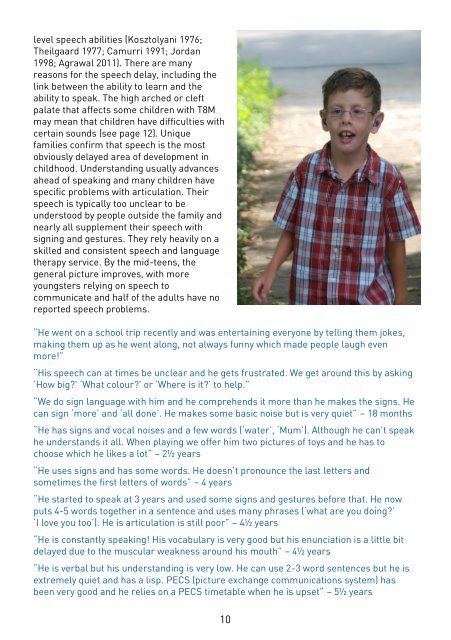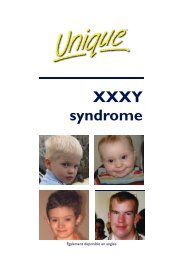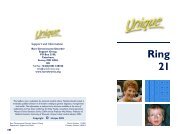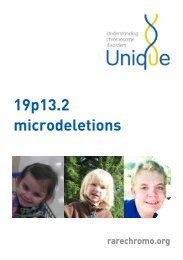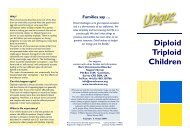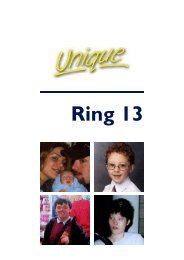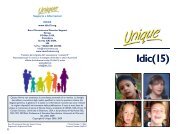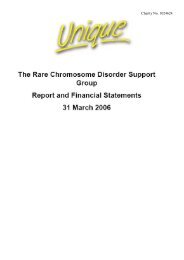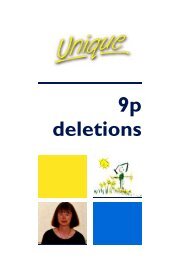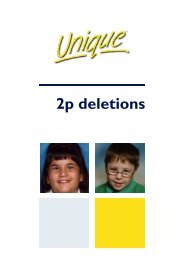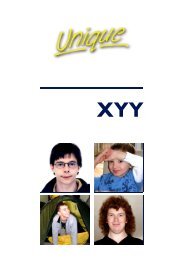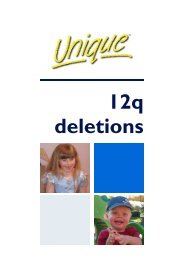Trisomy 8 Mosaicism - Unique - The Rare Chromosome Disorder ...
Trisomy 8 Mosaicism - Unique - The Rare Chromosome Disorder ...
Trisomy 8 Mosaicism - Unique - The Rare Chromosome Disorder ...
Create successful ePaper yourself
Turn your PDF publications into a flip-book with our unique Google optimized e-Paper software.
level speech abilities (Kosztolyani 1976;<br />
<strong>The</strong>ilgaard 1977; Camurri 1991; Jordan<br />
1998; Agrawal 2011). <strong>The</strong>re are many<br />
reasons for the speech delay, including the<br />
link between the ability to learn and the<br />
ability to speak. <strong>The</strong> high arched or cleft<br />
palate that affects some children with T8M<br />
may mean that children have difficulties with<br />
certain sounds (see page 12). <strong>Unique</strong><br />
families confirm that speech is the most<br />
obviously delayed area of development in<br />
childhood. Understanding usually advances<br />
ahead of speaking and many children have<br />
specific problems with articulation. <strong>The</strong>ir<br />
speech is typically too unclear to be<br />
understood by people outside the family and<br />
nearly all supplement their speech with<br />
signing and gestures. <strong>The</strong>y rely heavily on a<br />
skilled and consistent speech and language<br />
therapy service. By the mid-teens, the<br />
general picture improves, with more<br />
youngsters relying on speech to<br />
communicate and half of the adults have no<br />
reported speech problems.<br />
“He went on a school trip recently and was entertaining everyone by telling them jokes,<br />
making them up as he went along, not always funny which made people laugh even<br />
more!”<br />
“His speech can at times be unclear and he gets frustrated. We get around this by asking<br />
‘How big?’ ‘What colour?’ or ‘Where is it?’ to help.”<br />
“We do sign language with him and he comprehends it more than he makes the signs. He<br />
can sign ‘more’ and ‘all done’. He makes some basic noise but is very quiet” – 18 months<br />
“He has signs and vocal noises and a few words (‘water’, ‘Mum’). Although he can’t speak<br />
he understands it all. When playing we offer him two pictures of toys and he has to<br />
choose which he likes a lot” – 2½ years<br />
“He uses signs and has some words. He doesn’t pronounce the last letters and<br />
sometimes the first letters of words” – 4 years<br />
“He started to speak at 3 years and used some signs and gestures before that. He now<br />
puts 4-5 words together in a sentence and uses many phrases (‘what are you doing?’<br />
‘I love you too’). He is articulation is still poor” – 4½ years<br />
“He is constantly speaking! His vocabulary is very good but his enunciation is a little bit<br />
delayed due to the muscular weakness around his mouth” – 4½ years<br />
“He is verbal but his understanding is very low. He can use 2-3 word sentences but he is<br />
extremely quiet and has a lisp. PECS (picture exchange communications system) has<br />
been very good and he relies on a PECS timetable when he is upset” – 5½ years<br />
10


